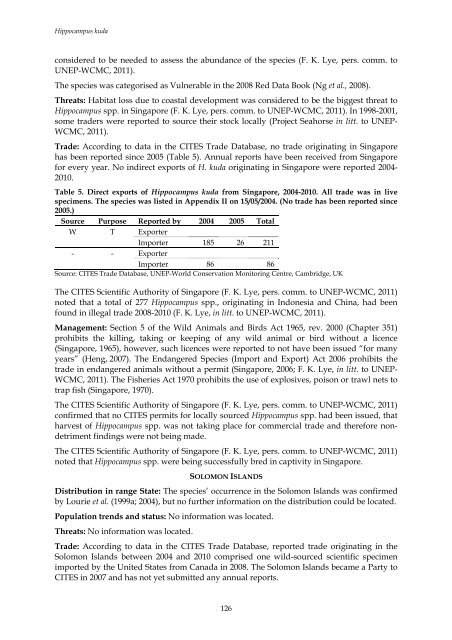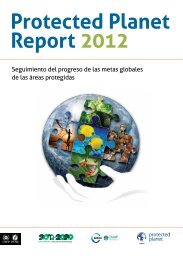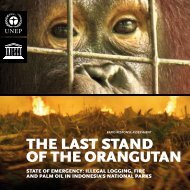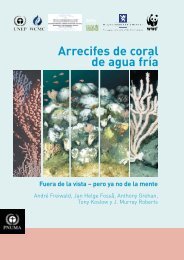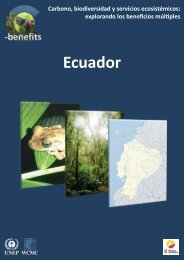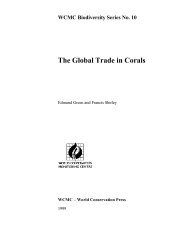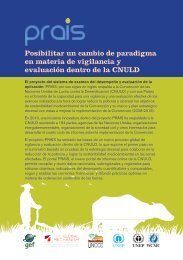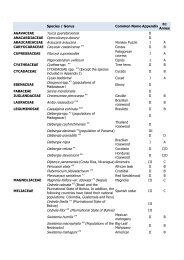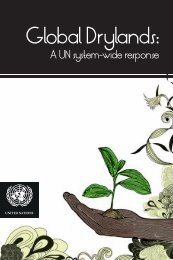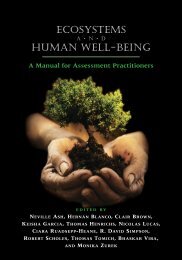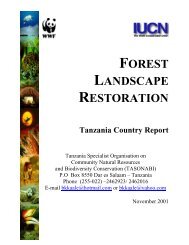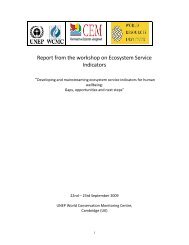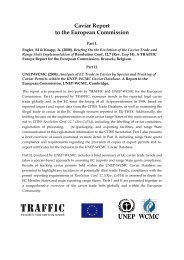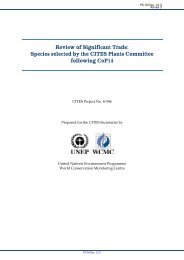2012. Review of Significant Trade - Cites
2012. Review of Significant Trade - Cites
2012. Review of Significant Trade - Cites
You also want an ePaper? Increase the reach of your titles
YUMPU automatically turns print PDFs into web optimized ePapers that Google loves.
Hippocampus kuda<br />
considered to be needed to assess the abundance <strong>of</strong> the species (F. K. Lye, pers. comm. to<br />
UNEP-WCMC, 2011).<br />
The species was categorised as Vulnerable in the 2008 Red Data Book (Ng et al., 2008).<br />
Threats: Habitat loss due to coastal development was considered to be the biggest threat to<br />
Hippocampus spp. in Singapore (F. K. Lye, pers. comm. to UNEP-WCMC, 2011). In 1998-2001,<br />
some traders were reported to source their stock locally (Project Seahorse in litt. to UNEP-<br />
WCMC, 2011).<br />
<strong>Trade</strong>: According to data in the CITES <strong>Trade</strong> Database, no trade originating in Singapore<br />
has been reported since 2005 (Table 5). Annual reports have been received from Singapore<br />
for every year. No indirect exports <strong>of</strong> H. kuda originating in Singapore were reported 2004-<br />
2010.<br />
Table 5. Direct exports <strong>of</strong> Hippocampus kuda from Singapore, 2004-2010. All trade was in live<br />
specimens. The species was listed in Appendix II on 15/05/2004. (No trade has been reported since<br />
2005.)<br />
Source Purpose Reported by 2004 2005 Total<br />
W T Exporter<br />
Importer 185 26 211<br />
- - Exporter<br />
Importer 86 86<br />
Source: CITES <strong>Trade</strong> Database, UNEP-World Conservation Monitoring Centre, Cambridge, UK<br />
The CITES Scientific Authority <strong>of</strong> Singapore (F. K. Lye, pers. comm. to UNEP-WCMC, 2011)<br />
noted that a total <strong>of</strong> 277 Hippocampus spp., originating in Indonesia and China, had been<br />
found in illegal trade 2008-2010 (F. K. Lye, in litt. to UNEP-WCMC, 2011).<br />
Management: Section 5 <strong>of</strong> the Wild Animals and Birds Act 1965, rev. 2000 (Chapter 351)<br />
prohibits the killing, taking or keeping <strong>of</strong> any wild animal or bird without a licence<br />
(Singapore, 1965), however, such licences were reported to not have been issued “for many<br />
years” (Heng, 2007). The Endangered Species (Import and Export) Act 2006 prohibits the<br />
trade in endangered animals without a permit (Singapore, 2006; F. K. Lye, in litt. to UNEP-<br />
WCMC, 2011). The Fisheries Act 1970 prohibits the use <strong>of</strong> explosives, poison or trawl nets to<br />
trap fish (Singapore, 1970).<br />
The CITES Scientific Authority <strong>of</strong> Singapore (F. K. Lye, pers. comm. to UNEP-WCMC, 2011)<br />
confirmed that no CITES permits for locally sourced Hippocampus spp. had been issued, that<br />
harvest <strong>of</strong> Hippocampus spp. was not taking place for commercial trade and therefore nondetriment<br />
findings were not being made.<br />
The CITES Scientific Authority <strong>of</strong> Singapore (F. K. Lye, pers. comm. to UNEP-WCMC, 2011)<br />
noted that Hippocampus spp. were being successfully bred in captivity in Singapore.<br />
SOLOMON ISLANDS<br />
Distribution in range State: The species’ occurrence in the Solomon Islands was confirmed<br />
by Lourie et al. (1999a; 2004), but no further information on the distribution could be located.<br />
Population trends and status: No information was located.<br />
Threats: No information was located.<br />
<strong>Trade</strong>: According to data in the CITES <strong>Trade</strong> Database, reported trade originating in the<br />
Solomon Islands between 2004 and 2010 comprised one wild-sourced scientific specimen<br />
imported by the United States from Canada in 2008. The Solomon Islands became a Party to<br />
CITES in 2007 and has not yet submitted any annual reports.<br />
126


